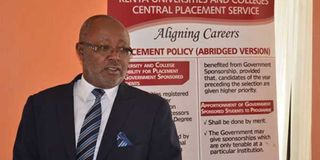State-sponsored students in the private universities got raw deal

Kenya Universities and Colleges Central Placement Service CEO John Muraguri in this picture taken on July 15, 2017. PHOTO | ANTHONY OMUYA | NATION MEDIA GROUP
What you need to know:
- But government-sponsored students in public universities pay Sh26,000 a year.
- This arrangement is a win-win for all the players involved.
Of the students selected by Kenya Universities and Colleges Central Placement Service (KUCCPS) to join public universities in 2016, about 12,000 were sent to private universities.
This was because the absorption capacity in public universities had been exhausted yet there were students who had scored above the cut-off point.
It was the first time this was being done. The only other time the government ‘sponsored’ students in private universities was when it allowed them to get study loans from the Higher Education Loans Board (Helb).
PUBLIC UNIVERSITIES
Sponsoring public students to study in private universities is welcome. Not only does it give them a chance to obtain higher education, it also shows the government’s good intentions for them and its confidence in the quality at the institutions.
According to media reports, the government is to lend the students the same amount as those in public universities — Sh70,000 a year.
But government-sponsored students in public universities pay Sh26,000 a year out of pocket for tuition fees, which is complemented by the Helb’s Sh70,000. The extra fees is increased only after careful evaluation.
The same regulation has not been extended to students in private universities. One would expect them to pay no more than Sh26,000 in out-of-pocket fees — like their public university counterparts. In any case, they are public-sponsored.
But this is not the case. For instance, some of the private universities charge the students upwards of Sh50,000 per year in additional tuition fees.
STUDENTS
The students then need to foot the bill for their accommodation and meals. If they live within the campus, their costs equal those incurred by private students.
Many have opted to live off-campus in nearby low-cost private houses.
It would not be a problem if the Helb allocated a slightly higher amount to these students for them to meet the extra costs.
Maximum allocation
However, the Helb’s maximum allocation a year is Sh50,000. So, students who pay Sh50,000 in out-of-pocket fees will, basically, be left with no additional funds to meet their accommodation and meals.
Such students must look for additional funds from their families or through other means. The question is, what happens to students who are unable to raise extra funds?
The least the Helb should award these students is Sh100,000 if they are to enjoy the same standards of living as their public university counterparts.
Half of this will cater for the increased out-of-pocket fees while the rest will supplement their other expenses, which are bound to be higher than those of students in public universities.
SPONSORSHIP
But the Helb seems to be cash-strapped and cannot lend more than Sh50,000 to the students.
Then, if the Helb cannot increase its lending to government-sponsored students in private universities, the government should either re-negotiate with private universities on the maximum amount the learners will pay out of the pocket or increase its sponsorship.
This is the only way the government’s good intention of sending the students to private universities will bear fruit. In the absence of government intervention, most of them are likely to drop out due to their inability to meet the additional costs imposed on them by the institutions.
This arrangement is a win-win for all the players involved.
One, private universities win from getting highly performing students, which increases competition in the faculties with the eventual elevation of the university’s standing.
Two, students get high-quality education by having access to better facilities than in most of the public universities.
Three, the government meets its initial goal of improving the transition from high school to university.
Dr Opembe (PhD) is a catalyst product development specialist and a member of the Kenya Scientists and Engineers Association. [email protected].




